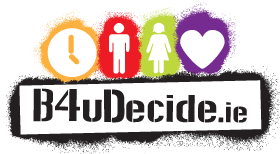B4uDecide.ie is closing down at the end of May 2024.
Alternative sources of relationships and sexuality information and resources:
- For 16-25 year olds: SpunOut.ie is an information provision website, including relationships and sexuality issues.
- For 17+ year olds: Sexualwellbeing.ie is the HSE website that provides information and resources on a wide range of information such as consent, contraception, sexual transmitted infections, vaccinations and unplanned pregnancy
- For parents: The HSE’s ‘Making the ‘Big Talk’ many small talks’ series of booklets to help parents and children talk about relationships and sexuality is available online, and to order free of charge from healthpromotion.ie. HSE funded RSE workshops are available at npc.ie and ifpa.ie
- For teachers: Junior Cycle SPHE Resources are available to support the new 2023 SPHE specification , including the Relationship and Sexuality strand.
- For youthworkers: HSE funded training on relationship and sexuality issues is available at REAL U | Foroige and Tailored Training Courses – National Youth Council of Ireland
About Us
The HSE Sexual Health and Crisis Pregnancy Programme (the Programme) is a national programme tasked with implementing Ireland’s first framework for sexual health and wellbeing, the National Sexual Health Strategy 2015 – 2020. The Programme also has a statutory responsibility for the delivery of three mandates as originally set out within the Crisis Pregnancy Agency (Establishment) Order 2001 (S.I. No. 446 of 2001).
The Programme is one of a number of national policy priority programme situated within the national Strategy and Planning function of the Health Services Executive.
The Programme delivers a programme of research, funding initiatives including crisis pregnancy counselling services, relationships and sexuality education programmes, communications campaigns, information provision and policy initiatives.
The business plan for the Programme is based on priority actions as outlined in the National Sexual Health Strategy 2015-2020 and additional actions related to the crisis pregnancy mandates. The Programme has responsibility for the implementation and monitoring of these actions which are reported on through the HSE service planning process.
To contact the Sexual Health & Crisis Pregnancy Programme please email info@crisispregnancy.ie or call 0766 959 130
The Programme website can be found here www.sexualwellbeing.ie
Developing this Campaign
In 2006, the Crisis Pregnancy Agency and the Department of Health and Children published the Irish Study of Sexual Health and Relatioships. It is a nationally representative study. For this study, 7441 Irish people from all over the country were interviewed over the phone. The study was done by the Royal College of Surgeons and the Economic and Social Research Institute.
In this study we found that:
- The majority of young people have sex for the first time at age 17 or older.
- Girls who had sex under age 17 were over 70% more likely to have a crisis pregnancy in their lifetime.
- Girls who had sex under age 17 were three times more likely to have an abortion in their lifetime.
- Boys and girls under 17 were twice as likely to get a sexually transmitted infection in their lifetime.
We also found that:
- Girls and boys who had sex under age 17 were more likely to say that they regretted it, that it was not a natural follow-on in their relationship and that they were not in love with the person.
- They were also more likely to say that they never had sex with that person again.
When we saw these findings, we decided that we should do a campaign to give young people the information they need to make informed decisions for themselves before they had sex for the first time. The first thing we did was spoke to teachers, parents, health promotion officers, youth workers about developing a campaign like this.
Some of the things they told us were:
- Young people need to be re-assured that everyone in their group of friends is not having sex, even though they might give the impression that they are.
- Teenagers, boys and girls, need advice about saying no to people who are pressuring them to have sex.
- The campaign should not be patronising and it should not “talk-down” to teenagers.
After talking to the adults, about 40 people in total, we went out and spoke to teenagers from Dublin, Cork, Limerick, Donegal, Waterford, and Louth.
They told us that:
- It was very common for teenagers, especially boys, to exaggerate about their level of sexual experience.
- Pressure to have sex came from friends or other people in their group who may have had sex themselves.
- In some schools there was pressure to have sex at age 15, in other schools, pressure to have sex did not start until 5th year or 6th year. In some schools, there was no pressure at all.
- Girls who had boyfriends were under more pressure than girls who didn’t.
- Some people thought that you could feel more pressured into having sex if your girlfriend or boyfriend already had sex in a previous relationship.
- Pressure to have sex was worse if you were shy or under confident.
- Teenagers use alcohol as an excuse for behaviour that they regret.
We used this information to develop content for the b4udecide.ie campaign. The campaign is for teenagers most importantly, but it is also for parents, teachers and youth workers, to help them in talking to teenagers in their care about relationships and sex.
